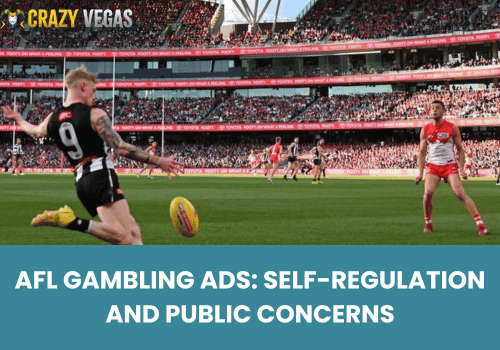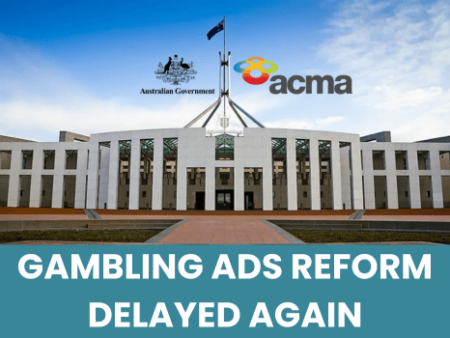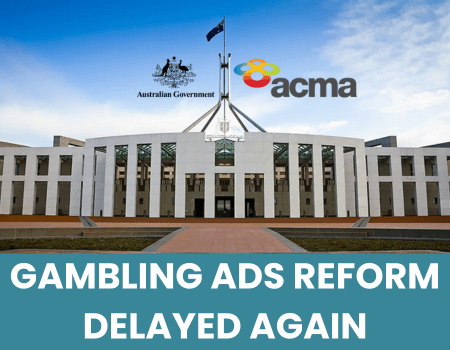The entanglement of sports and gambling advertising has become increasingly conspicuous, especially within the realm of Australian Rules Football (AFL). As families gather to enjoy the excitement of AFL games, they are often bombarded with a barrage of gambling advertisements, raising concerns about the normalisation of betting among viewers, particularly young audiences.
In this blog, we delve into the complexities surrounding gambling ads in AFL, examining self-regulation efforts, public health concerns, and the urgent need for regulatory action.

The Impact of Gambling Ads on AFL
Within minutes of the commencement of an AFL game, viewers are inundated with a multitude of gambling advertisements, with some matches featuring over 70 ads before 8 pm. Despite repeated assurances from gambling companies like Tabcorp that they would minimise advertising to protect vulnerable individuals, the reality paints a starkly different picture. Such pervasive advertising not only normalises gambling but also poses a significant risk to individuals susceptible to addiction.
Self-Regulation Efforts by Clubs and Bookmakers
In response to mounting public pressure, some AFL clubs and bookmakers have taken steps to self-regulate their advertising practices. However, these efforts have been inconsistent and often fall short of addressing the root causes of the issue. While some clubs have banned gambling ads at their home grounds, others continue to endorse such practices, contributing to the normalisation of gambling within the sport.
Tabcorp’s Advertising Policy Breach
A notable example of self-regulation failure came to light when Tabcorp breached its advertising policy by displaying ads during prohibited hours. Despite acknowledging the error, such lapses underscore the inadequacy of voluntary measures in curbing the proliferation of gambling ads in AFL.
Public Health Concerns and Expert Opinions
Public health experts have long warned about the adverse effects of gambling advertising, particularly on vulnerable populations such as children and young adults. Research indicates that exposure to gambling ads can lead to increased gambling behaviours and the normalisation of betting within society. Samantha Thomas, a gambling researcher at Deakin University, emphasises the need for stricter regulations to protect young people from the pervasive influence of gambling advertising.
Inconsistencies in Self-Regulation Across AFL Clubs
While some AFL clubs have taken proactive steps to distance themselves from gambling sponsorship deals, others continue to maintain lucrative partnerships with gambling companies. This disparity in self-regulation standards highlights the need for a unified approach to tackling the issue across the league.
Community Sentiment and Calls for Regulatory Action
Surveys conducted among AFL fans reveal overwhelming support for a ban on gambling ads at stadiums, underscoring the disconnect between public sentiment and industry practices. Ron Issko, president of the AFL Fan Association, expresses frustration at the lack of regulatory action and calls for immediate intervention to address the normalisation of gambling within the sport.
Government Response and Policy Development
Despite mounting pressure, the government’s response to calls for regulatory action has been sluggish. While discussions surrounding the implementation of stricter regulations are ongoing, concrete steps toward curbing the proliferation of gambling ads in AFL are yet to materialise.
Advocacy for a Total Ban on Gambling Ads
Advocates and public health organisations continue to push for a total ban on gambling ads during AFL games, citing the need to protect vulnerable individuals from harm. The late Labor MP Peta Murphy’s parliamentary inquiry, which called for a ban on gambling ads, serves as a testament to the growing consensus surrounding the urgency of the issue.
Delayed Government Action and Stakeholder Reactions
The delay in the government’s response to the parliamentary inquiry, coupled with Murphy’s recent passing, has further prolonged the wait for regulatory action. Stakeholders, including public health advocates and industry experts, stress the importance of swift intervention to address the detrimental impact of gambling advertising on society.
Challenges and Opportunities in Regulating Gambling Ads
As the debate surrounding gambling advertising in AFL intensifies, stakeholders must work collaboratively to devise effective regulatory measures that prioritise public health and well-being. While challenges persist, there exists an opportunity to enact meaningful change and safeguard future generations from the harmful effects of excessive gambling promotion.
In conclusion, gambling advertising in AFL represents a multifaceted dilemma that demands urgent attention from policymakers, industry stakeholders, and the broader community. By prioritising public health and adopting a comprehensive regulatory framework, we can mitigate the adverse impact of gambling advertising and foster a safer and more inclusive sporting environment for all.



















